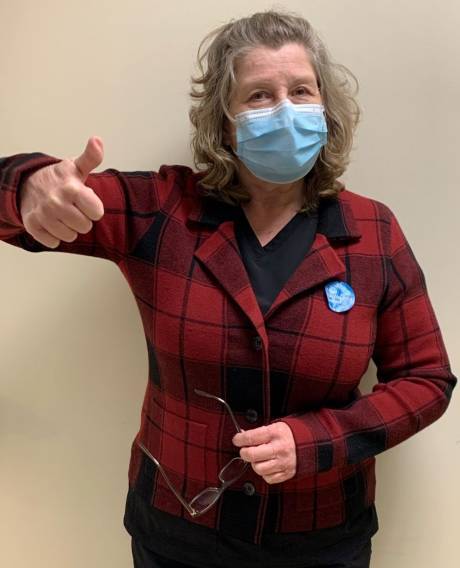
Other than “a little arm soreness,” Laurie Kilbury Taylor, DO, an attending physician in the Emergency Department at United Memorial Medical Center, said she had no problem with the initial dose of the Pfizer COVID-19 vaccine and is looking forward – for a number of reasons – to completing the process.
Kilbury Taylor (pictured above) was among the first UMMC staff members to receive the vaccine – “I felt very privileged to be invited to be in the first group,” she said – and said all of her colleagues are on board with being vaccinated.
She took part in a Zoom videoconference interview this morning to give an update on how she is feeling and share some of her other thoughts after getting the first of two shots last Thursday.
“Right afterwards, I felt normal. There was no pain .. I had no side effects; I had no allergic reaction,” she said. “And then, I think later on in the day, I felt a little arm soreness and that extended until the next day.”
She said she took some ibuprofen when she got home and again the next day.
“That was about it. Since then, then I’ve been fine,” she added.
Kilbury Taylor said the procedure is similar to the flu and other vaccinations, noting that the arm soreness “is to be expected when they stick a sharp needle in your arm.”
“Maybe it was a little bit more than what the flu shot was, but much less than, say, the tetanus shot,” she said.
Still, she said she had no restriction of motion and was able to do everything she needed to do.
According to the Food & Drug Administration, side effects of the vaccine typically begin within two days and are resolved a day or two after that. The most common consequences listed are tiredness, headache, muscle pain, chills, joint pain and fever.
On a personal note, Kilbury Taylor shared that her 83-year-old mother, who has some medical issues, lives with her.
“I am always worried about coming home and having to take care of her and possibly transmitting COVID to her unknowingly because there are some asymptomatic carrier people,” she said. “Also, myself, if you haven’t noticed, I’m a little older and I do have asthma. So, for me being working in an environment where I’m constantly confronted with patients that have COVID or suspected COVID – although I’m wearing PPE (Personal Protective Equipment) -- it only takes once to touch your face when you don’t realize you’re doing it.”
Kilbury Taylor said the vaccine provides hope of ending the pandemic and help “to reduce this so we can get back to somewhat normal lives.”
“I am very hopeful that this can help us take care of our patients better, with more confidence. I hope that it will reduce transmission, and I hope, most importantly, is to reduce the severity,” she said. “Some of these people get very, very sick, and it may not prevent getting infected but it may – as the flu shot does – decrease the severity of the illness if you do get sick.”
She said she is scheduled to get the second of the two doses on Jan. 4. The two doses combined reportedly are 94- to 95-percent effective.
She also encourages people to not believe everything they read or hear on the internet or on social media.
“Despite the fear you see on the internet, those aren’t reputable sources … It was very easy, very little discomfort,” she said. “I’m excited. It’s something you can do for your family and the community …”
Kilbury Taylor said the vaccine gives her some “reassurance” that eventually she will have some protection against the virus.
“It’s not instantaneous. It takes a few weeks to build your immunity and get the booster shot. We, of course, will continue to use the PPE and wear our gowns and our masks and our shields, our gloves – and wash in and out – but it’s a sense of hope that eventually these restrictions will be relaxed,” she said.
Other doctors and medical professionals are ready and willing to get the vaccine, she said.
“They can’t wait to get the vaccine, and they’re worried. 'Are they going to run out before I get mine?’ is the biggest concern of the physicians.”
Photo courtesy of Rochester Regional Health.
